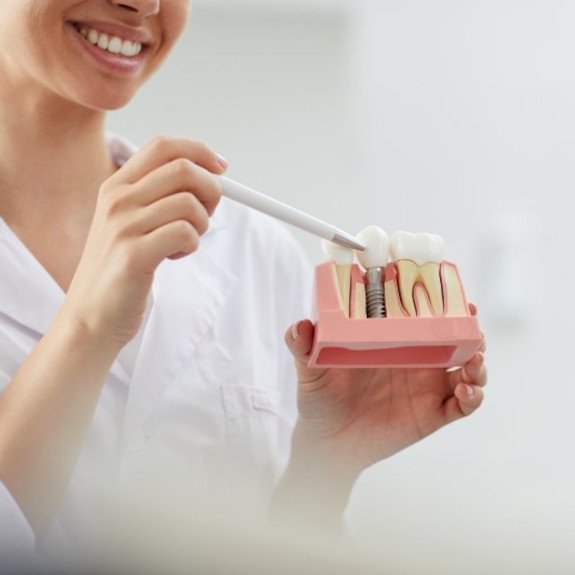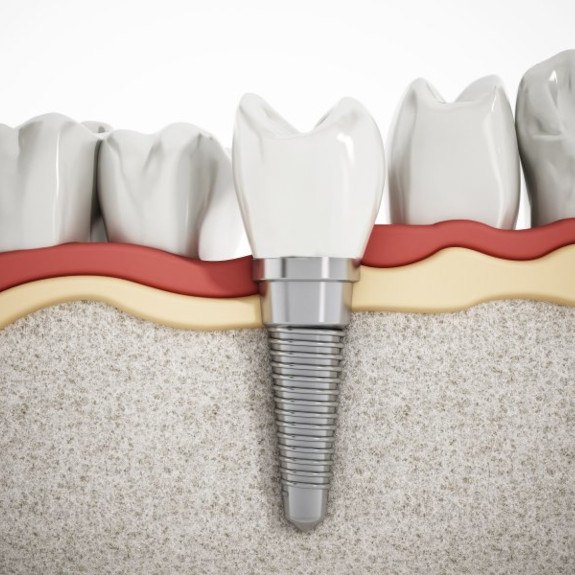If you’re missing one or more teeth, it can be hard to smile confidently or eat your favorite foods. Traditional solutions like dentures and dental bridges can help, but they don’t quite feel like your natural teeth. That’s where dental implants in Dublin, OH come in. This innovative tooth loss treatment recreates every part of your missing teeth, offering strength and longevity that other options simply cannot. If you’re ready to learn more about what dental implants can do for you, contact us to schedule your consultation at Distinctive Smiles of Dublin!
Why Choose Distinctive Smiles of Dublin for Dental Implants?
- Partnered with Dublin’s Best Dental Implant Experts
- Flexible Dental Financing Plans Available
- Amenities Provided to Keep Patients Comfortable
What are Dental Implants?
Dental implants are small titanium posts that fuse to your jawbone, allowing them to act as replacements for the roots of your missing teeth. Because titanium is biocompatible, the implant posts gradually fuse to your jawbone until they have formed a powerful bond. This fusion process, called osseointegration, gives dental implants the strength they need to support any number of replacement teeth – whether it’s a custom dental crown, bridge, or denture. Essentially, dental implants are built just like real teeth, so they’re able to look and feel exactly like them!
The 4-Step Dental Implant Process
This treatment is incredibly effective at rebuilding missing teeth, and it involves a multi-step plan to provide the results you’re looking for. Our team will walk you through the entire dental implant process during your first visit so that you know what to expect. The details of the treatment can vary from patient to patient, but here are the four basic steps of the process.
Initial Dental Implant Consultation

You’ll first meet with one of our dentists to discuss your smile goals and determine whether you’re a good candidate for dental implants. They will thoroughly assess your oral and overall health to see if you’ll be able to undergo minor oral surgery, and they’ll check if your jawbone is sufficient enough to support the titanium posts. Our team will also want to verify that you’re free of any underlying issues like gum disease or infection so that we can address these beforehand. If there are any preliminary services that you might need, such as gum disease treatment, bone grafting, or tooth extraction, we’ll need to complete these first before continuing with your dental implant surgery.
Dental Implant Surgery

Our team will refer you to a trusted oral surgeon, who will place the implant posts in your jaw. At the start of your procedure, you’ll be provided with local anesthesia so that you can undergo the process entirely pain-free. Your dental team might even administer sedation dentistry to keep you as relaxed as possible throughout your visit. The surgeon will then make small incisions in your gum line so that they can insert the dental implants in their preplanned angles and locations. Afterward, they will suture the gums closed so that you can go home to rest and recover.
Dental Implant Osseointegration & Abutment

Your dental implants should merge with your jawbone over three to six months via a process called osseointegration. This is what will create the foundation that will keep your new teeth stable and long-lasting. During this time, you will mainly prioritize keeping the area bacteria-free so that there are no risks of periodontal disease or infection. After you’ve fully recovered, you will return to us so that we can attach metal abutments to the implants.
Delivery of Dental Implant Restoration(s)

After your gums have healed from receiving your abutments, you’ll come back to our office to receive your new teeth. We will place your custom restoration (crown, bridge, or denture) on top of your abutments to complete your smile. Before sending you on your way, we’ll confirm that your bite is correct and that you are happy with your results. If so, you’ll be free to show off your brand-new pearly whites.
Benefits of Dental Implants
The majority of dentists and patients consider dental implants as the gold standard of tooth replacements. Not only can they restore your bite, but they’ll help preserve your jawbone as well as the rest of your remaining pearly whites. By recreating lost teeth from the roots up, dental implants can provide multiple benefits over traditional options. Here are some of the essential benefits of dental implants and what you can expect to appreciate from your results.
Day-to-Day Benefits

- Stronger bite: While traditional options like dentures are durable, they can sometimes slip out of place when eating. Dental implants, however, can help you regain 80% or more of your natural chewing power, allowing you to eat all of your favorite food without any restrictions.
- Simple maintenance: Unlike dental bridges and dentures, you won’t need to use any special products or techniques to clean your dental implants. Simply brush, floss, rinse them with mouthwash, and visit your dentist for checkups to maintain them.
- Natural-looking results: Your dental implants will be fitted with lifelike restorations that are both durable and appear like natural pearly whites. Others won’t even be able to tell the difference.
Health Benefits

- Optimal comfort: With dental implants, you won’t have to worry about the typical issues you might find with traditional dentures or bridges, such as gum irritation, tooth sensitivity, or jaw soreness. In many cases, patients feel so comfortable with their implants that they forget they even have them.
- Comprehensive solution: Since dental implants serve as your new permanent roots, they can stimulate your jawbones and prevent deterioration in your facial structure. You’ll be able to preserve your remaining pearly whites while retaining a more youthful appearance.
- Protect your existing teeth: Dental implants are directly supported by your jawbone, meaning they won’t have to rely on your natural teeth to remain in your mouth. They’ll also serve as placeholders to prevent your other teeth from shifting out of place due to tooth loss.
Long-Term Benefits

- Effective solution: Dental implants boast a success rate of 95% or more, even 10 years after being placed. This is due to the advanced technology and techniques used to plan and perform the procedure, ensuring a more reliable treatment compared to other traditional options.
- Long-lasting results: Unlike dental bridges and dentures, which tend to go as far as several years, dental implants can last several decades to a lifetime! You also won’t require replacements as frequently as you would with more traditional restorations. This can save you time and money in the future.
Who Dental Implants Can Help
If you’re a generally healthy adult who is looking to replace one or more missing teeth, then there’s a good chance that you qualify for dental implants! This versatile treatment can be used to bring back any number of teeth, from a single space to an entire mouthful. Your procedure will be personalized based on your unique situation, and we’ll recommend one of the following treatment options.

Missing Single Tooth
To replace a single missing tooth, a dental implant post can be inserted into the socket where the tooth’s root once was. The implant is then topped with a lifelike dental crown via an abutment. In the end, your new tooth will be indistinguishable from your remaining ones!

Missing Multiple Teeth
For several missing teeth in a row, we can secure a dental bridge onto two implant posts. This solution restores chewing ability, looks fully natural, and doesn’t require the alteration of existing teeth as regular bridges do. For multiple missing teeth that are located throughout the mouth, we can craft a partial denture and secure it onto a small number of strategically placed implants.

Missing All of Your Teeth
Even if you have no natural teeth left, you can still benefit from dental implants! Four to eight implant posts can be placed at specific locations and angles in the jawbone to anchor a full denture in place. Implant dentures eliminate many common complaints of traditional dentures, including gum irritation, difficulties speaking and eating, and jawbone deterioration.
Understanding the Cost of Dental Implants
A tooth replacement as complex as dental implants typically comes at a higher price point than other options. Rest assured, though, that dental implants end up being an incredible investment in the long run.
Since no two smiles are the same, the cost of dental implants varies greatly between patients. We’ll be sure to go over the factors affecting your treatment beforehand, as well as walk you through your financial options.
Factors Affecting Dental Implant Price
There is no one-size-fits-all in dentistry, and that means the cost of procedures varies on a case-by-case basis. Some of the factors which will affect what you will pay for your dental implant procedure include the following:
- How many teeth are missing – Dental implant posts are individually priced, so this will have perhaps the biggest impact on the cost of the procedure.
- Location of the missing teeth – Front teeth are generally more costly to replace due to the complexity of cosmetic concerns.
- How healthy the jawbone is – Many patients will require a bone graft prior to getting dental implants, an additional procedure which ups the total cost of tooth replacement.
- Additional costs which may be associated with the procedure, like sedation for soothing nerves.
Whatever the total cost of dental implants, they offer a number of benefits compared to a traditional denture or fixed bridge -- including enhanced stability, better oral and overall health, and, when cared for properly, they can last a lifetime. Those advantages combined make this replacement worth its weight in gold.
Does Dental Insurance Cover Dental Implants?
Dental insurance is there to make necessary dental services more affordable, and as such, it will cover some aspects of the dental implant procedure. However, most plans do not cover the full cost of dental implants. If you need help paying for dental implants, patient financing through groups like CareCredit allows you to make smaller, more convenient payments on larger medical bills. Most patients are approved.
Why You Should Schedule a Consultation
Your dentist can only tell you so much about your tooth replacement over the phone. The best way to know for sure how much your dental implants will cost is to schedule a consultation with our dental office. When you do, Dr. Buck can evaluate the extent of your tooth loss, take X-rays and scans to determine how much healthy bone structure remains, and then give you an accurate estimate for what you can expect to pay. Then, our financial experts can help you figure out how to make dental implants fit comfortably in your budget.
Dental Implant Frequently Asked Questions
Dental implants have quickly become one of the most popular replacement options for their health benefits, ability to provide a natural-looking restoration, and longevity. Because you may still have questions about dental implants, here are some FAQs with their answers included.
The cost of your dental implants will depend on a few factors: where you need them, how many you need, the type of implant, whether you need bone grafting, and more. There is also an additional cost for the restoration (the crown, bridge, or denture) that is mounted on your implants. The only way to know your specific cost is to visit us for a consultation. Dr. Buck will give your mouth a careful examination to give you an estimate of your cost.
One of the many benefits of dental implants is their permanence. With proper care, the dental implant itself can last a lifetime. A good oral healthcare routine consisting of brushing, flossing, and regular dental visits are the best way to extend the lifespan of your dental implants.
Most discomfort associated with dental implants happens after the procedure. Because your jawbone doesn’t contain any pain-feeling nerves, the placement of your implants is relatively painless. Your oral surgeon will make sure you’re numb and comfortable before starting the treatment. Afterward, you may feel some pain, soreness, or experience bruising around the area, but this will go away after a few days.
If you have dentures that slip, slide, or shift when you eat, talk, laugh, and more, dental implants can help! Using some strategically placed dental implants as anchors, Dr. Buck can attach your dentures to them to create a stable and supported smile. You won’t have to worry about your dentures sliding around, plus, you will have stronger biting power to eat more of your favorite foods.
Most candidates for dental implants have a strong enough jaw to hold them in place and are committed to good oral health. However, even if you have a weaker jawbone, Dr. Buck may be able to perform a bone graft to accommodate dental implants. The only way to know for sure is to contact us today to schedule a visit. Dr. Buck will examine your mouth to see if you’re a candidate for dental implants and answer any additional questions that you may have.
It’s fairly common for the back molars to be extracted, whether due to gum disease, tooth decay, trauma, or a broken tooth. After you’ve had a molar extracted, you’re probably going to wonder whether or not you really need to replace that missing tooth. Since it’s in the back of the mouth, no one will see the missing tooth, so why replace it? Although the missing tooth may not be highly visible, you must replace missing teeth. Tooth replacement not only improves your oral function and smile, but it also protects your remaining teeth from damage. Now, you have multiple options when it comes to replacing a back molar.
When you lose a tooth, your smile and quality of life will decline. However, many other complications will develop. Once you lose a tooth, your surrounding teeth no longer have adequate support. Not to mention, the lack of stimulation in the area causes the bone and surrounding structures to begin to deteriorate. As deterioration progresses, your remaining teeth will continue to lose support. The inadequate support will eventually cause the remaining teeth to begin to shift. Over time, they can become misaligned, leading to tooth decay and gum disease. And, chances are, the surrounding teeth will eventually fall out.
While one missing tooth may not seem like a very big deal, you will quickly begin to notice the implications of not replacing that tooth. Your ability to eat properly will also become impacted. You’re likely to find that you’re no longer able to eat many of the foods you enjoy.
As eating becomes more challenging, you’ll also notice that the gum where the tooth is missing begins to become easily irritated. Not to mention, the gum space also becomes susceptible to gum disease, which can spread to impact your surrounding teeth and underlying bone.
Sure, missing a tooth in the back may not seem like a big deal, but in reality, even one missing tooth, no matter where it’s located, is a very big deal. You need to use an appropriate form of tooth replacement to quickly replace the tooth before more damage occurs.
The most affordable and common option to replace a back molar is with a bridge or crown. While both are effective, some downsides come with these options. For example, you won’t have the same biting force or appearance of a natural tooth. Plus, your surrounding teeth are more prone to tooth decay, and you’ll likely need to have a replacement bridge or crown made in the future.
Dental implants are the best option to replace a back molar. Implants look and function just like your natural teeth. You’ll have a permanent solution to tooth loss using an implant that closely mimics natural teeth. You’ll resolve all of the complications and risks associated with a missing tooth to protect your oral health and quality of life.
I Need a Checkup & Cleaning I Need a Dentist for My Child I am Concerned About Bleeding Gums I Have a Cavity or Broken Tooth I am Missing One or More Teeth I Want to Enhance My Smile I Want a Straighter Smile I am Scared of the Dentist I am in Pain & Need Help I am Concerned About Sleep Apnea I Have Pain in My Jaw View Our Services





